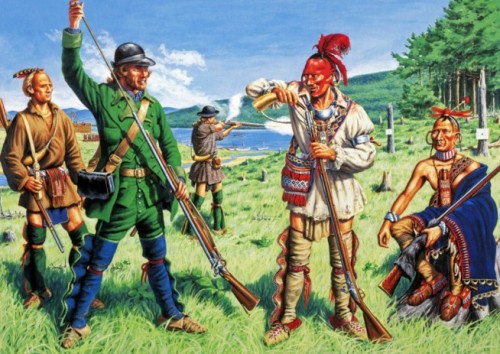bantarleton:Askshiva wanted more on here about Rogers’ Rangers. Ask and thee shall receive! Rogers’
bantarleton:Askshiva wanted more on here about Rogers’ Rangers. Ask and thee shall receive! Rogers’ Rangers was initially a provincial company from the colony of New Hampshire, attached to the British Army during the Seven Years’ War/French and Indian War. The unit was quickly adopted into the British Army as an independent ranger company. It was trained by Major Robert Rogers as a rapidly deployable light infantry force tasked mainly with reconnaissance, as well as conducting special operations against distant targets. Their tactics, built on earlier colonial precedents (but codified for the first time by Rogers) proved remarkably effective, so much so that the initial company was expanded into a ranging corps of more than a dozen companies (containing as many as 1,200–1,400 men). The ranger corps became the chief scouting arm of British Crown forces by the late 1750s. The British valued them highly for gathering intelligence about the enemy and conducting raids behind enemy lines.Later, acted the American Revolutionary War broke out the company was revived as a Loyalist force, once again in support of the Crown. Rogers initially commanded it again, but by the 1770s he was aging and had passed his prime. The Rangers were mostly reconstituted into the Queens Rangers under the able command of Robert Graves Simcoe. The Queens Rangers were considered by many to be the sister regiment to Tarleton’s British Legion, and they operated side-by-side throughout 1777. Alongside the Legion they proved to be one of the most effective Loyalist regiments of the war.Three modern-day military formations now claim descent from Rogers’ Rangers:The Queen’s York Rangers (1st American Regiment) of the Canadian Army, formed by Rogers and Loyalist veterans of Rogers’ Rangers;The 1st Battalion 119th Field Artillery of the Michigan National Guard, with members directly descended from the 30-strong detachment of Rogers’ Rangers stationed in Fort Detroit; andThe 75th Ranger Regiment, US Army, who claim they revive the traditions of Rogers’ Rangers but whose members have no direct personal line of descent from the original group. -- source link
Tumblr Blog : bantarleton.tumblr.com




